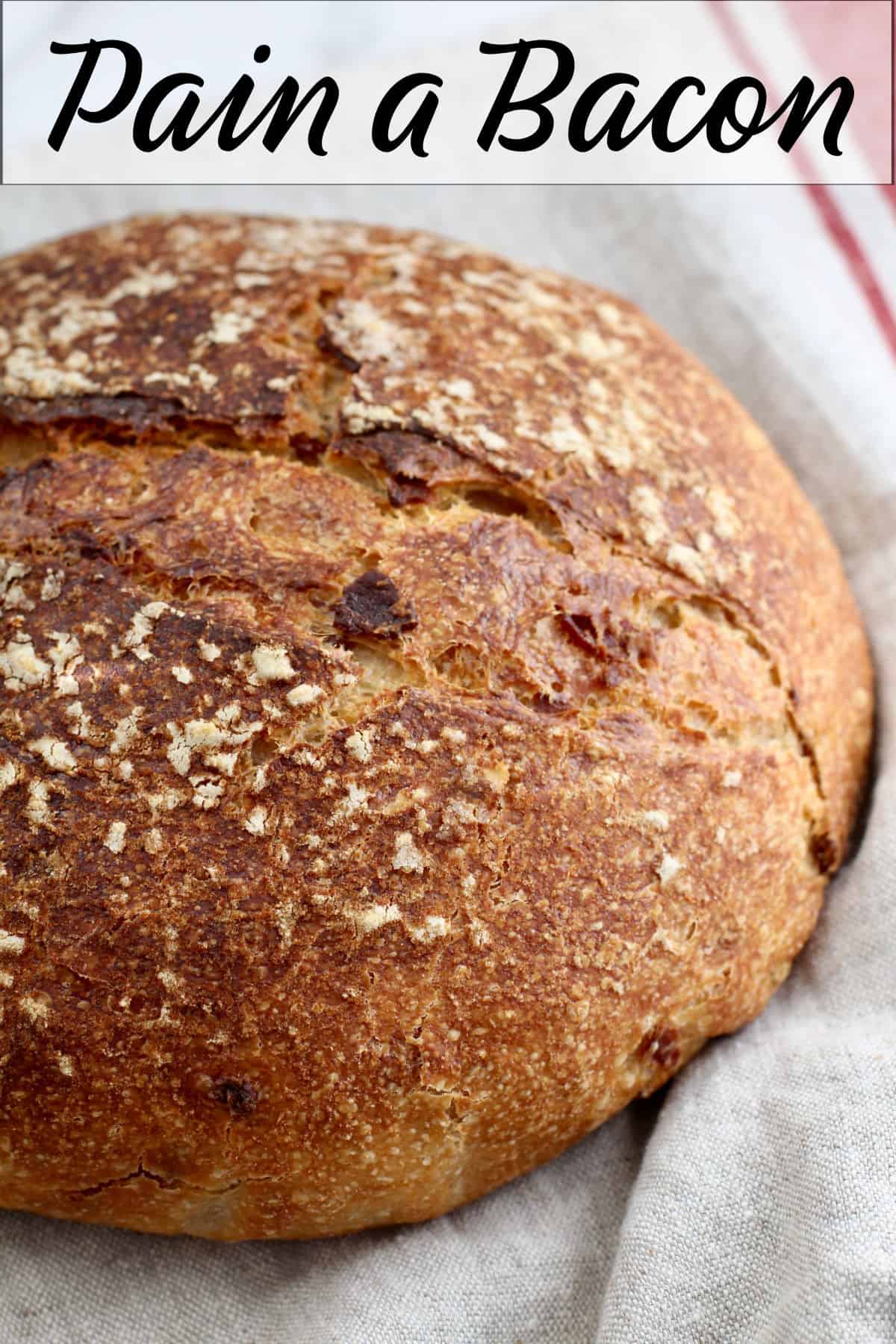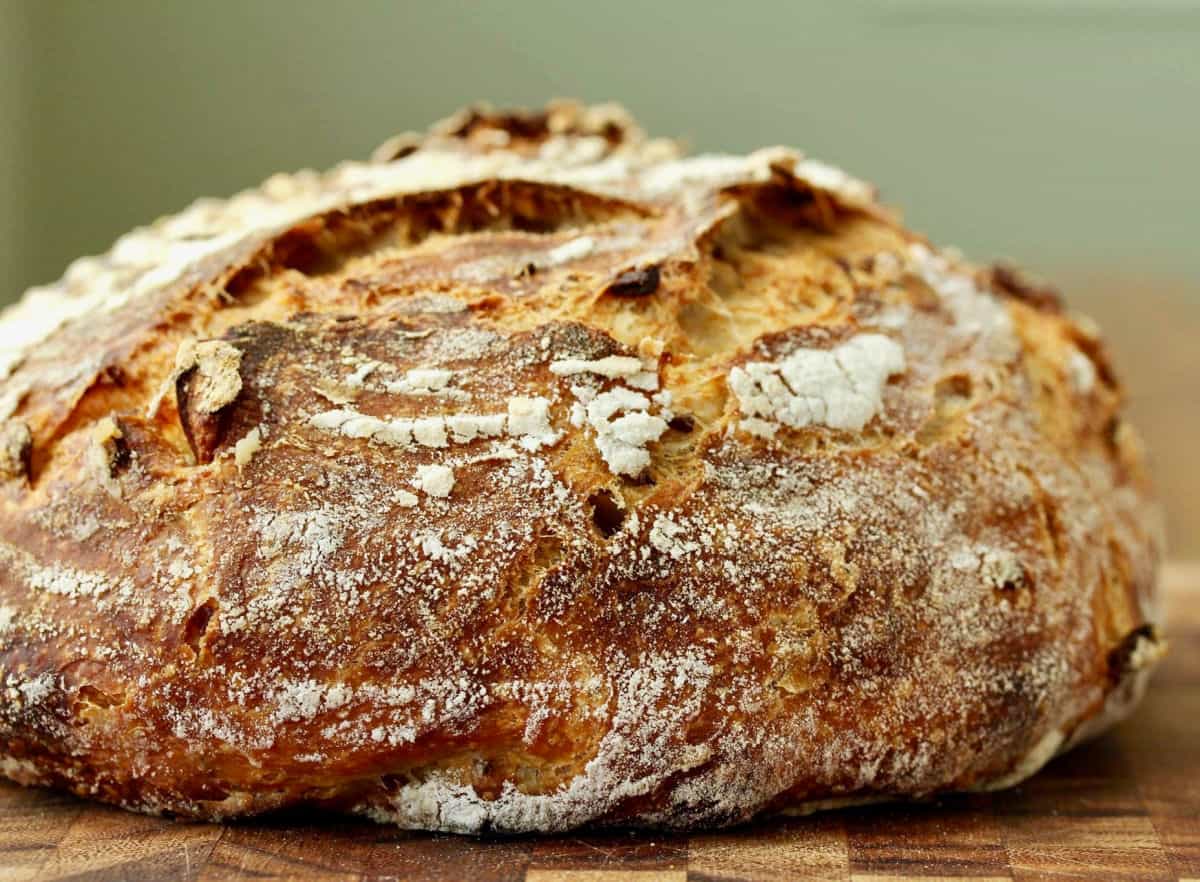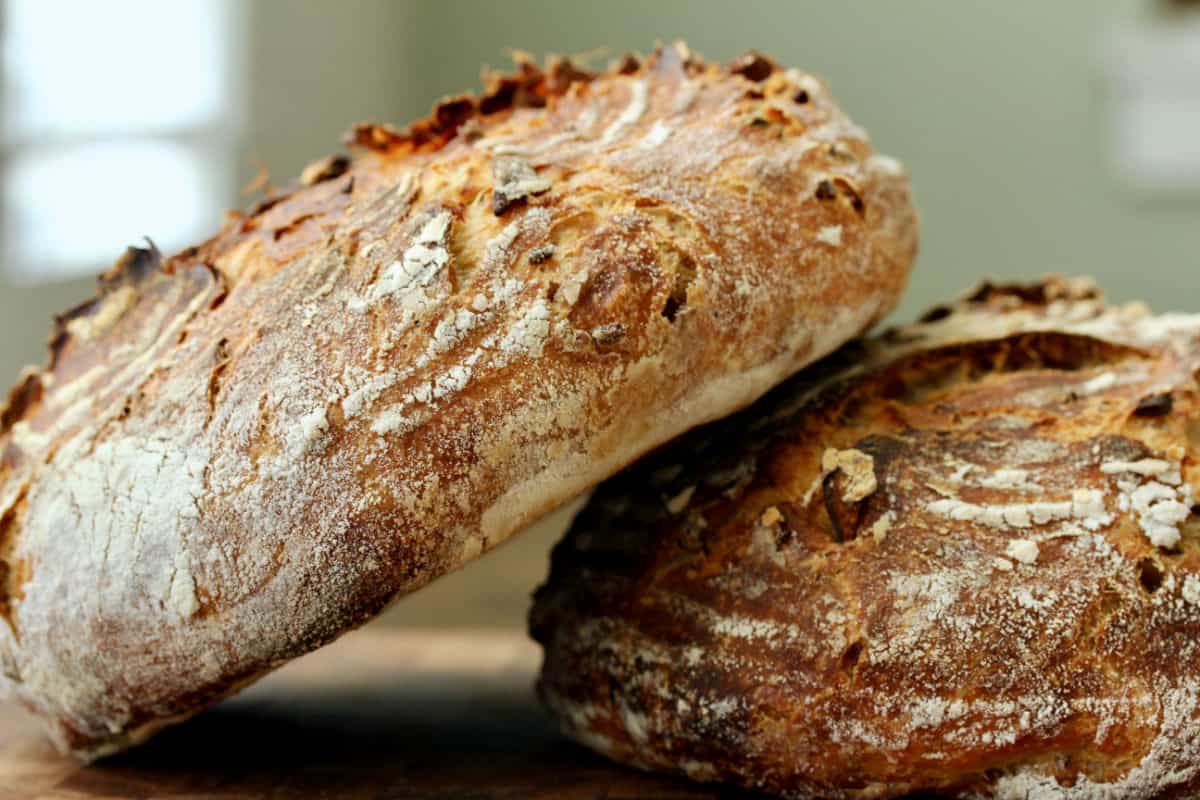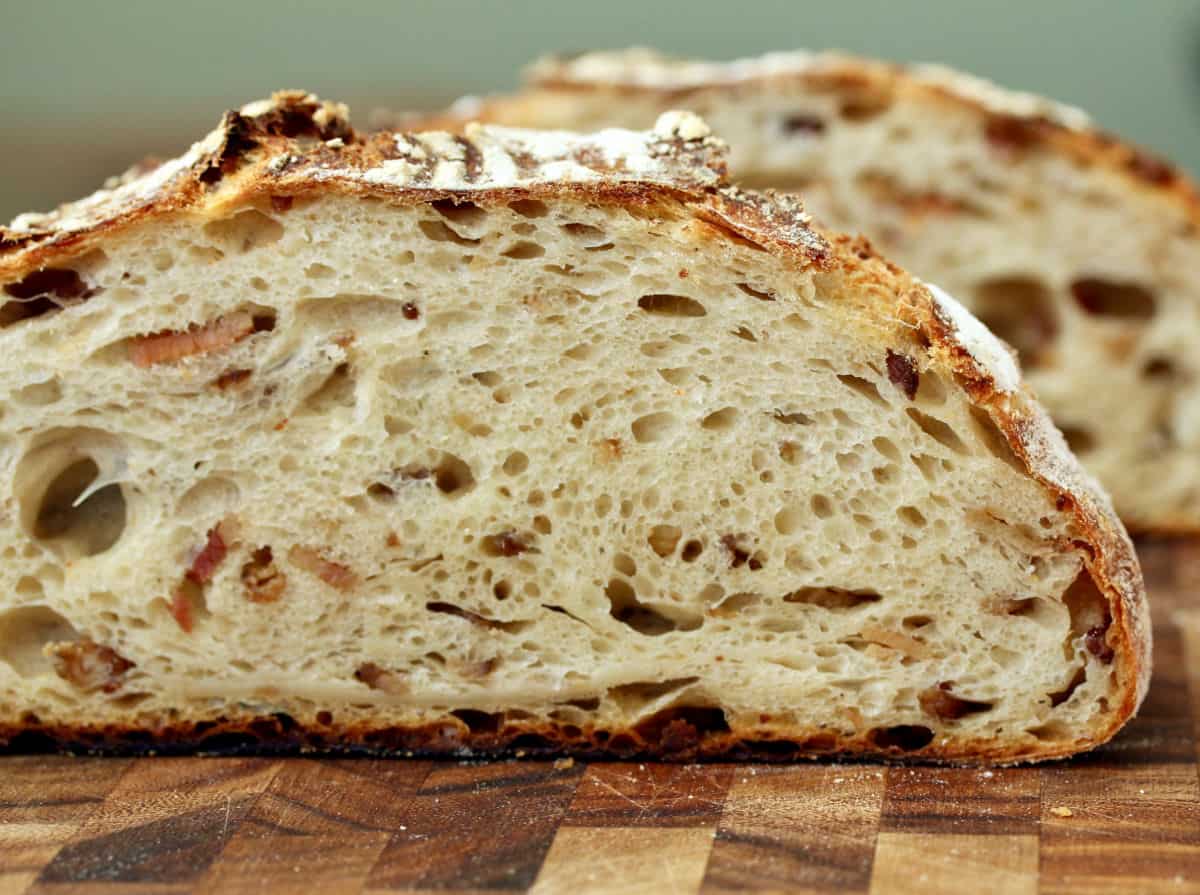This pain au bacon, or bacon sourdough bread, combines the acidity of sourdough bread with the salty meatiness of bacon.
Imagine a half of a pound of bacon (prior to cooking) in a loaf of sourdough bread.
Bread. Bacon. Sourdough. This Pain au Bacon has been calling my name ever since I made the Overnight Country Blonde Bread from Ken Forkish's amazing book Flour Water Salt Yeast: The Fundamentals of Artisan Bread and Pizza.
I had to try making this bread.
When bacon enters the land of wild yeast, it's bread meets bacon for a decadent and delicious combination. You can actually smell the bacon as this bread is baking.
The hardest part of making this bread, besides waiting for the dough to rise, is not eating bits of the cooked bacon before adding it to the dough.
Schedule to Make Pain au Bacon:
Once you have a mature, active levain, this bread takes a couple of days to make, mostly inactive time.
First, feed your starter with a mixture of white flour, whole wheat flour, and water, and let it ferment all day.
In the evening, mix the dough and then do three "stretch and folds" over a couple of hours and let it rise overnight.
The next morning, shape the loaves and bake them about 3 to 4 hours later.
This recipe mentions "stretch and fold" a few times. How do you do this, you ask? You take the dough from all four "sides," and stretch it up and over the middle of the dough, one "side" at a time. It's an amazing method for developing gluten in wet dough without kneading.
Just set your timer for 30 minute intervals at the beginning of proofing to perform the "stretch and folds." You will feel the dough tighten up each time as the gluten develops.
Imagine a slice of the bread toasted, buttered, and topped with a fried egg.
What about using this bread for a grilled cheese and tomato sandwich?
How about spreading it with avocado, adding tomato, turkey, and sprouts...? It's practically health food. You could also use this to make a "reconstructed" club sandwich or a BLT.
This bread is also amazing for French toast.
This bread also makes amazing croutons!... perfect for a wilted mixed green salad.
Note: This is an updated recipe, original published in May, 2014 and updated in August, 2022. The original recipe calls for making a lot of levain, most of which you discard. I have since cut back on making so much levain to cut down on waste, but if you are new to sourdough, feel free to experiment.
I've published the original amount, but feel free to cut the levain amount in half or even less.
Also, you can play around with the starting oven temperature, including trying a cold start oven.
This week's From Our Dinner Table theme is Bacon! Check out all of the delicious sounding bacon recipes.
Bring on the Bacon!
- Bacon Wrapped Meatloaf from That Recipe
- BLT Tacos from A Kitchen Hoor's Adventures
- Goat Cheese Stuffed Bacon, Peach, & Basil Burgers from The Spiffy Cookie
- Maple Bacon Grilled Broccoli from Palatable Pastime
- Pain au Bacon (Bacon Sourdough) from Karen's Kitchen Stories
- Side Pork Bacon from Art of Natural Living
We share Recipes From Our Dinner Table! Join our group and share your recipes, too! While you're at it, join our Pinterest board, too!
Pain au Bacon (Bacon Sourdough Bread)

Ingredients
- 100 grams mature active levain/sourdough starter
- 400 grams unbleached all purpose flour
- 100 grams whole wheat flour
- 400 grams lukewarm water
- 864 grams unbleached all purpose flour
- 16 grams whole wheat flour
- 686 grams water at about 90 degrees F
- 20 grams fine sea salt
- 1 pound of bacon, cooked to crispy, and then crumbled**
- 2 tablespoons reserved bacon drippings
- 216 grams of the levain
- **(note: regular bacon reduces down to about 6 ounces, so if you use a low fat or turkey bacon, weight the bacon after cooking to add 6 ounces to the dough)
Instructions
- Mix the levain ingredients in a medium bowl, cover with plastic wrap, and let sit for about 10 hours, until bubbly.
- In a large bowl or dough rising bucket, mix the flours and water by hand until just incorporated. Cover and let it rest for about 30 minutes.
- Add the salt and he levain. If your kitchen is a cold, a bit more levain might be helpful.
- Using a wet hand, mix the dough by alternatively pinching it to distribute the salt, and folding it to begin to develop the gluten. Cover and rest for 10 minutes.
- Spread the bacon drippings over the dough and add the crumbled bacon. Using the pincer method alternating with stretching and folding, mix all of the ingredients in the bucket.
- Cover the dough with plastic wrap, and let it sit for 30 minutes.
- In the next 90 minutes, stretch and fold the dough 3 times, every 30 minutes.
- Cover and let rest for about 10 to 12 hours, until about tripled in volume.
- With wet hands, gently scrape the dough out onto a lightly floured surface. Divide the dough in half with a dough scraper.
- Gently shape each half into a loose boule.
- Flour two bannetons or bowls with a mixture of wheat and rice flour.
- Shape the dough halves into medium tight boules and place them seam side down into the baskets. Cover with oiled plastic wrap.
- Let the loaves proof for about 3 1/2 to 6 hours, depending on the room temperature. Poke the dough with your finger to about 1/2 inch into the dough. If it grows back slowly, the dough is ready. With this dough, you will get a lot of oven spring, so don't over proof it. You will have a lot of leeway, especially, if it's not too hot in your kitchen.
- About 45 minutes before baking, preheat the oven to 475 degrees F with two empty covered Dutch ovens placed on the middle rack.
- When you are ready to bake, cut parchment into two 9 inch by 15+ inch pieces.
- Remove the Dutch ovens from the oven and remove the tops. One loaf at a time, place the parchment over the dough and place a plate over it. Flip the dough over, remove the basket, and lift and place the loaf in the Dutch oven by using the parchment as a sling (leave the paper under the dough). Cover the Dutch oven and place it in the hot oven. Repeat with the second loaf.
- Bake covered for 30 minutes, and then uncover it and bake it for 15 to 20 minutes more, until the interior of the bread reaches 205 to 210 degrees F and the bread is a deep brown.
- Lift the loaves out of the Dutch ovens with the parchment and let them cool fully on a wire rack (remove the parchment from the bottom of the loaves).
Nutrition Facts
Calories
144.58Fat (grams)
4.47Sat. Fat (grams)
1.48Carbs (grams)
21.46Fiber (grams)
0.94Net carbs
20.53Sugar (grams)
0.08Protein (grams)
4.11Sodium (milligrams)
217.61Cholesterol (grams)
6.52










We put bacon in a couple of breads last year, and they were always winners. However, I haven't tried it in a sourdough, and it sounds like the best idea ever!
ReplyDeleteThank you Movita. It's so good.
DeleteWow! Karen, this bread looks like a work or art. When it is all said and done I bet this is total satisfaction. Love it!
ReplyDeleteIt is Cheri! Thanks so much.
DeleteFantastic work Karen! Wish you lived around here, so we could reach all those amazing loafs of bread!:D:D Espeacially using them as 'papara' (http://parthena.ca/2011/03/12/greek-salad-horiatiki/) in a traditional Greek salad, would be heavenly !
ReplyDeleteExcellent bread!
Wish I was around there too! That salad looks so good!
DeleteThis bread has me drooling... Looks really great!
ReplyDeleteThanks Maurizio. That means a lot coming from you!
DeleteWhy do you make so much levain if you only need 216g?
ReplyDeleteYou probably don't have to make that much, and I've kind of cut back since I first made this bread. Ken Forkish advocates for making a lot and tossing a lot of excess. I've learned to manage it and still make the bread. However, if you are an avid hobby or professional baker, all of that levain can be used to make several loaves. Of course, you will not want to use it all up, because you will want to save some to feed and grow.
DeleteWhat is done with all the left over leaving? How long will it last in the refrigerator? There is so much I am at a loss.
ReplyDeleteYou can refrigerate it and keep it going. You can definitely make less as well if you don't want so much left over.
DeleteIt’s safe to leave the bacon too temperature all night?
ReplyDeleteWe did and it was fine. To be safe, use cured bacon.
DeleteIs the boule that is placed in the oven seam side up?
ReplyDeleteYes, it is seam side up.
DeleteThis is inspirational! I sooo have to get back to bread making this fall.
ReplyDeleteThat crumb looks amazing! And the crust, and the bacon, and the whole dang loaf!
ReplyDeleteI would love to try this and your site intrigues me, but you have ads that I cannot remove that cover the directions. There is no way for me to read all the directions, especially the very first and probably most important paragraph.
ReplyDeleteThat's not been an issue for me. Try using the "print" button on the recipe.
DeleteHi. I made the bacon bread. Added some garlic confit. Delish! Thanks for the recipe. Dagne
ReplyDeleteI was dismayed to make such a large levain...maybe a note about that at the beginning of the recipe could warn us. I ended up making one loaf out of the levain with a small amount of flour added to make a high hydration bread.
ReplyDelete